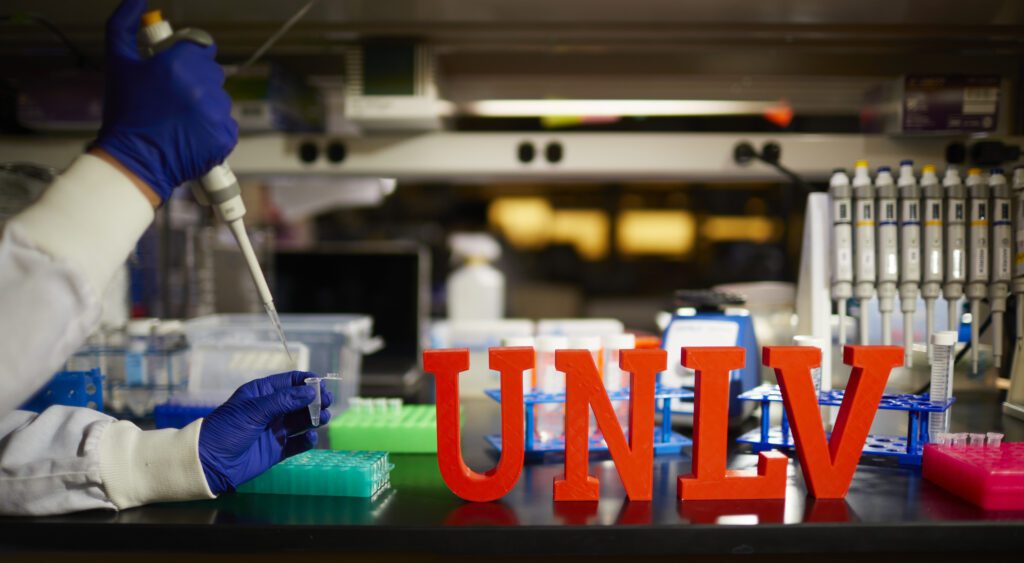Though synonymous with the “entertainment capital of the world,” Nevada, a rapidly expanding US state out west, has a story far richer than the casinos and nightlife to its name. “The Silver State,” an ode to its 1859 silver rush beginnings, is the nation’s first major silver-mining district. Its biodiversity is richer than you think, with 314 named mountain ranges and 309 living species that you won’t find anywhere else. It’s the country’s third most ethnically diverse state too.
Today, Nevada is well-known for another reason: University of Nevada, Las Vegas’s (UNLV) School of Integrated Health Sciences. At this R1-classified research institution, students and researchers are striving to improve the state of healthcare across the city, state, and the world beyond. Founded in 1966 as the Medical Arts Division and renamed in 2019, the school is taking critical steps to transform students into healthcare pioneers who deliver quality patient care.

In one of the US’s most diverse states, UNLV is home to an international community, connecting students to a global network. Source: University of Nevada, Las Vegas
Transformative programmes shaping the future of healthcare
The School of Integrated Health Sciences is home to three departments with a wide selection of interdisciplinary programmes. One of them is the undergraduate Applied Health Sciences programme, which is dedicated to preparing students for health-focused careers through a holistic, hands-on, and connected experience.
If students are looking to absorb and advance research on physical activity, nutrition, dietetics, or medical nutrition therapy, the Department of Kinesiology and Nutrition Sciences is where they’d go — and it’s also where the UNLV Athletic Training Programme lives. Through the Master of Science in Athletic Training (MSAT), students complete 61 credits over the span of two years, building real-world skills during clinical internships and gaining theoretical knowledge in a Commission on Accreditation of Athletic Training Education (CAATE) accredited programme.
For students looking to become movement experts providing hands-on, life-changing care to patients, the Department of Physical Therapy is ideal. It’s home to the Doctor of Physical Therapy programme, a three-year, entry-level professional programme setting students up for in-demand careers in hospitals, private practices, outpatient rehabilitation centres, and more. For aspiring pioneers of health physics, comprehensive medical imaging, and radiography, the Department of Health Physics and Diagnostic Sciences offers a range of rigorous, cutting-edge programmes from bachelor’s to PhD level.
UNLV also offers several doctoral programmes that challenge students to innovate and respond to the field’s most pressing issues. There’s the Doctor in Occupational Therapy, perfect for those seeking to become exceptional occupational therapists and clinical scholars leading change in the communities in which they live and serve. Meanwhile, the PhD in Interdisciplinary Health Sciences, focuses on nurturing independent and innovative researchers who will lead interdisciplinary research collaborations. The PhD in Neuroscience is a great option for those who want to pursue post-doctoral research, followed by independent research careers in a variety of workplace settings, including academic, medical, and government institutions, as well as private industries. In the near future, UNLV will launch a PhD in Sports Sciences.

The School of Integrated Health Sciences’s department-specific labs range from radio imaging labs to exercise physiology labs. Source: University of Nevada, Las Vegas
What a degree at UNLV can do for your future
Many programmes are accredited by national organisations, a testament to their impact. It’s not just all talk when it comes to delivering quality education and research.
But for Adetayo Babarinde, a PhD in Interdisciplinary Health Sciences student from Nigeria, there’s something even better than that at UNLV: a caring, cosmopolitan community.
The support between faculty and students is something she can see and feel. “I have the opportunity to interact with different departments and have worked with different faculties,” he says. “They are always willing to speak with you about anything you want to discuss. I also like the fact that students’ voices are heard.”
The university is amongst the top five in the nation for diversity (US News and World Report). This was a key reason why Babarinde chose UNLV in the first place, feeling it could be a place where she could grow. Given individualised attention, she was encouraged and empowered – so much so that she could develop her skills beyond research, through grant writing and teaching practical lab sessions.
It was the same for Szu-Ping Lee when he first joined as a faculty member in the Department of Physical Therapy. “When I came to UNLV, I was given a lot of freedom to try different things. It was the best support I could have hoped for,” he says.
Since then, he’s worked with several international students from across the world, from Taiwan to Iran and Pakistan. “I was lucky enough 21 years ago to have the opportunity to come to the US and learn,” Lee says. “Now, I’m in a position to pay it forward and I want to give other international students the same opportunities that I had.”
To make an impact on healthcare, begin your journey at the UNLV School of Integrated Health Sciences today.
Follow the School of Integrated Health Sciences on Facebook, Instagram, and LinkedIn.

